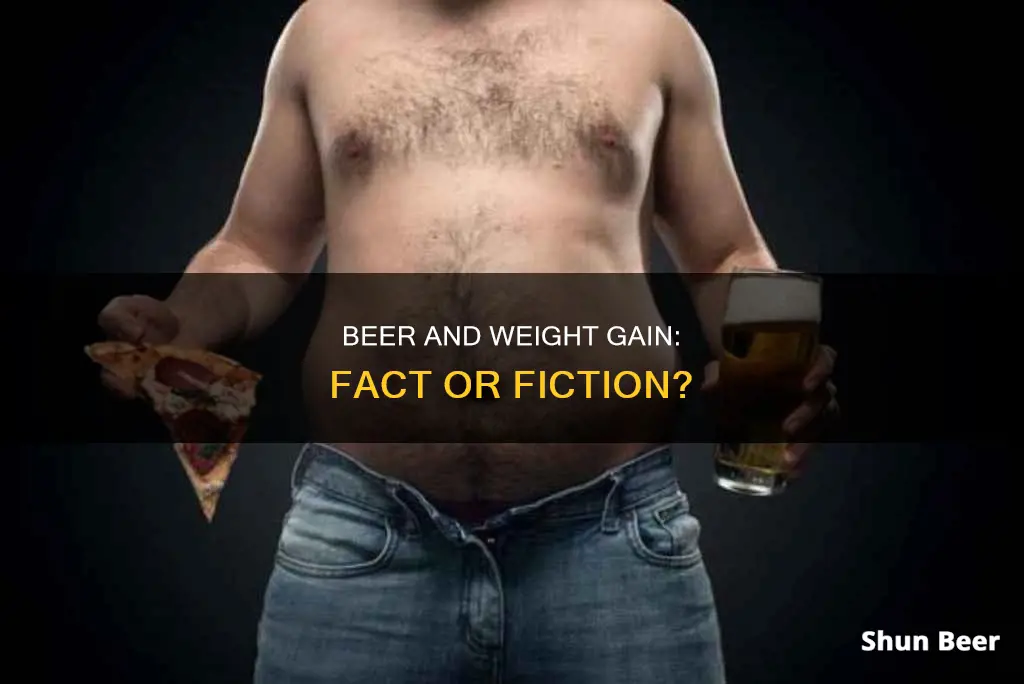
Beer has a reputation for causing weight gain, but does it deserve it? The answer is complicated. While beer is high in calories and can increase appetite, it's not the only factor contributing to a beer belly. Age, sex, hormones, diet, and physical activity levels also play a role. Furthermore, the link between beer and weight gain is stronger in men than in women, possibly due to differences in metabolism and drinking habits. So, while beer alone may not make you fat, excessive drinking and unhealthy lifestyle choices can certainly tip the scales.
| Characteristics | Values |
|---|---|
| Calories | Beer contains as many calories as a soft drink, with a typical beer containing 150 calories. |
| Appetite | Alcohol can increase your appetite and lower inhibitions, leading to unhealthy food choices. |
| Fat burning | Alcohol prevents your body from burning fat as your liver breaks down alcohol instead. |
| Phytoestrogens | Beer contains phytoestrogens, which can mimic the female sex hormone oestrogen and may increase the risk of storing belly fat. |
| Health complications | Excessive alcohol consumption is linked to various health complications, including high blood pressure, heart disease, and liver disease. |
| Weight loss | Reducing alcohol intake or switching to low-calorie options may help prevent weight gain. |
What You'll Learn

Beer is high in calories
The calorie content of beer depends on its strength. Beers with a higher alcohol content tend to have more calories. A standard 12-ounce (355-millilitre) serving of beer with 4% alcohol content has around 153 calories. In contrast, a light beer typically has about 100 calories. Cocktails and mixed drinks tend to have even more calories than beer and wine, due to the addition of liqueurs, juices, and syrups.
Beer also contains small amounts of micronutrients, including sodium, potassium, and magnesium. However, you would need to consume large quantities of beer to satisfy your daily requirements of these nutrients.
Beer Consumption for Octogenarians: How Much is Safe?
You may want to see also

Alcohol stops your body from burning fat
Alcohol is a toxin that your body wants to get rid of as soon as possible. When you drink alcohol, your body prioritises breaking it down over burning fat. This is because alcohol is calorie-dense, making it an attractive energy source for the body. As a result, you are not burning fat while drinking.
The liver turns the ethanol in alcohol into acetaldehyde, which is relatively toxic to the body. Acetaldehyde is also carcinogenic as it can damage DNA and stop the body from repairing itself. In the second stage of metabolisation, the body turns acetaldehyde into acetic acid, or acetate, a less active byproduct that can be easily eliminated.
While the body is attracted to the high-calorie content of beer, wine and spirits, it is a love-hate relationship. The body considers ethanol, the organic compound produced during fermentation, a toxin or waste product. It will shut down all other metabolic pathways until the alcohol is out of your system. Working through that ethanol can take the body up to 36 hours.
Alcohol and Weight Gain
The more you drink, the higher your risk of weight gain. Alcohol is often referred to as "empty" calories—it provides your body with calories but contains very few nutrients. There are almost 155 calories in one 12-ounce can of beer, and 125 calories in a 5-ounce glass of red wine. Drinks with mixers, such as fruit juice or soda, contain even more calories.
Alcohol can also affect your organs. Excess alcohol consumption can lead to alcoholic fatty liver, which can damage your liver and affect how your body metabolises and stores carbohydrates and fats. Changes in the way your body stores energy from food can make it very difficult to lose weight.
Alcohol can also contribute to excess belly fat. The "beer gut" isn't just a myth. Foods and drinks that are high in sugar, including beer, are also high in calories. Extra calories that aren't burned off as energy will be stored as fat in the body.
How to Avoid Weight Gain
If you're trying to lose weight, it's best to decrease the amount you're drinking overall. Think of alcohol as a way of celebration, rather than a way of daily life. You can also opt for drinks with fewer calories and less sugar, such as hard seltzers, light beer, and red wine.
Beer and Clarithromycin: Is It Safe to Drink?
You may want to see also

Alcohol affects hormones that control appetite, hunger and stress
Alcohol may affect the hormones that control appetite, hunger, and stress. Alcohol is high in calories and can increase abdominal fat. While a small portion of the calories from alcohol accumulates as fat near your midsection, alcohol also impacts the way your body burns fat. When you drink alcohol, your liver breaks down alcohol instead of fat. As a result, fat may accumulate in your abdominal region.
Drinking alcohol can impair the functions of your glands that release hormones, which may cause weight gain. Generally, glands in your body release the right amount of hormones at an exact time, sending messages to your tissues. These messages aid in your body's stress response and help control your energy and metabolism.
For example, your adrenal glands, found on top of your kidneys, secrete cortisol, a stress hormone. Cortisol helps your body respond to stress by increasing blood pressure and heart rate. However, heavy drinking may cause your adrenal glands not to regulate how much cortisol they secrete. As a result, people who drink heavily may have high cortisol levels, which can increase abdominal weight gain. Cortisol redistributes fat tissue to your abdominal region and increases cravings for high-calorie foods.
Alcohol can also reduce your blood sugar level, which may increase hunger. Some evidence suggests that people may seek high-carb foods to satisfy their cravings if their blood sugar dips slightly. As a result, people with diabetes may need to be cautious with alcohol. Drinking alcohol with diabetes medication, especially on an empty stomach, may cause low blood sugar.
Additionally, alcohol may stimulate the release of ghrelin, a hormone that regulates hunger and increases appetite and food intake. Studies have shown that heavy drinkers administered with ghrelin experienced an increased craving for alcohol.
Beer and Ice Cream: A Delicious Combination or a Disaster?
You may want to see also

Alcohol is linked to an increase in body fat
The link between alcohol consumption and weight gain is stronger in men than in women. This is partly because men tend to drink more heavily than women and are more likely to store fat around their bellies. Additionally, alcohol can lower testosterone levels, which increases the risk of weight gain, especially around the midsection.
Beer is often associated with an increase in body fat, particularly around the belly, commonly referred to as a "beer belly". However, it is important to note that the link between alcohol consumption and weight gain is complex and depends on various factors, including drinking frequency and individual lifestyle factors.
While the relationship between alcohol and weight gain is not fully understood, alcohol may contribute to weight gain by interfering with fat metabolism, increasing appetite, and promoting unhealthy food choices.
Copper Mugs and Beer: Safe or Not?
You may want to see also

Beer may prevent fat burning
Drinking alcohol can also affect your appetite and hunger levels. Alcohol can reduce your blood sugar level, which may increase your hunger. Some studies have shown that drinking alcohol can increase your appetite in the short term, causing you to eat more than you otherwise would. Alcohol can also activate cells in your brain that signal intense hunger.
In addition, alcohol is high in calories. Gram for gram, beer contains as many calories as a soft drink. A typical beer has 150 calories, and if you drink several in one sitting, you can end up with a significant calorie overload. Alcohol is also considered a high-energy substance, with seven calories per gram compared to four calories per gram for carbohydrates and protein.
The combination of increased calorie intake and decreased fat burning can contribute to weight gain, including belly fat. While the link between alcohol consumption and weight gain is not entirely clear, studies have shown a positive association between alcohol intake and abdominal obesity, especially in men.
To minimise the risk of weight gain, it is important to monitor your alcohol consumption and maintain a healthy, active lifestyle.
Does Beer Expire? Drinking Beer Past Its Best Before Date
You may want to see also
Frequently asked questions
Drinking beer can lead to weight gain, but it is not the beer itself that causes a "beer belly". Any excess calories, whether from alcohol, sugary drinks, or large portions of food, can increase fat around the waistline.
The liver breaks down alcohol instead of fat, so drinking beer can prevent your body from burning fat. Beer is also high in calories, so drinking several in one sitting can lead to a calorie overload.
The best way to avoid gaining a "beer belly" is to drink in moderation, exercise regularly, and maintain a healthy diet.
Yes, drinking beer, especially in excessive amounts, has several serious health risks, including high blood pressure, heart disease, stroke, liver disease, and an increased risk of certain cancers.







